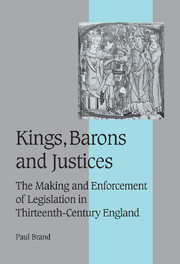Book contents
- Frontmatter
- Contents
- List of tables
- Preface
- List of abbreviations
- INTRODUCTION
- Part I Politics and the legislative reform of the common law: from the Provisions of Westminster of 1259 to the Statute of Marlborough of 1267
- Chapter 1 THE MAKING OF THE PROVISIONS OF WESTMINSTER: THE PROCESS OF DRAFTING AND THEIR POLITICAL CONTEXT
- Chapter 2 THE MAKING OF THE PROVISIONS OF WESTMINSTER: THE SOCIAL AND LEGAL CONTEXT AND THE EVOLUTION OF THE INDIVIDUAL CLAUSES: I
- Chapter 3 THE MAKING OF THE PROVISIONS OF WESTMINSTER: THE SOCIAL AND LEGAL CONTEXT AND THE EVOLUTION OF THE INDIVIDUAL CLAUSES: II
- Chapter 4 THE ENFORCEMENT OF THE PROVISIONS OF WESTMINSTER DURING THE INITIAL STAGE OF THEIR EXISTENCE, 1259–63
- Chapter 5 THE REVISION AND REISSUING OF THE PROVISIONS, 1263–4
- Chapter 6 THE REVISED PROVISIONS IN ACTION, 1263–7
- Chapter 7 THE FINAL REVISION AND REISSUE OF THE PROVISIONS OF WESTMINSTER: THE STATUTE OF MARLBOROUGH OF 1267
- Part II Beyond politics: the enforcement and interpretation of the Statute of Marlborough in the courts, 1267–1307
- Chapter 16 CONCLUSIONS
- Appendix I TEXT AND TRANSLATION OF THE PROVISIONS OF WESTMINSTER OF 1259
- Appendix II TEXT AND TRANSLATION OF THE PROVISIONS OF WESTMINSTER AS REISSUED IN 1263 AND 1264
- Appendix III TEXT AND TRANSLATION OF THE STATUTE OF MARLBOROUGH OF 1267
- Bibliography
- Index
- Cambridge Studies in Medieval Life and Thought Fourth series
Chapter 7 - THE FINAL REVISION AND REISSUE OF THE PROVISIONS OF WESTMINSTER: THE STATUTE OF MARLBOROUGH OF 1267
Published online by Cambridge University Press: 16 June 2009
- Frontmatter
- Contents
- List of tables
- Preface
- List of abbreviations
- INTRODUCTION
- Part I Politics and the legislative reform of the common law: from the Provisions of Westminster of 1259 to the Statute of Marlborough of 1267
- Chapter 1 THE MAKING OF THE PROVISIONS OF WESTMINSTER: THE PROCESS OF DRAFTING AND THEIR POLITICAL CONTEXT
- Chapter 2 THE MAKING OF THE PROVISIONS OF WESTMINSTER: THE SOCIAL AND LEGAL CONTEXT AND THE EVOLUTION OF THE INDIVIDUAL CLAUSES: I
- Chapter 3 THE MAKING OF THE PROVISIONS OF WESTMINSTER: THE SOCIAL AND LEGAL CONTEXT AND THE EVOLUTION OF THE INDIVIDUAL CLAUSES: II
- Chapter 4 THE ENFORCEMENT OF THE PROVISIONS OF WESTMINSTER DURING THE INITIAL STAGE OF THEIR EXISTENCE, 1259–63
- Chapter 5 THE REVISION AND REISSUING OF THE PROVISIONS, 1263–4
- Chapter 6 THE REVISED PROVISIONS IN ACTION, 1263–7
- Chapter 7 THE FINAL REVISION AND REISSUE OF THE PROVISIONS OF WESTMINSTER: THE STATUTE OF MARLBOROUGH OF 1267
- Part II Beyond politics: the enforcement and interpretation of the Statute of Marlborough in the courts, 1267–1307
- Chapter 16 CONCLUSIONS
- Appendix I TEXT AND TRANSLATION OF THE PROVISIONS OF WESTMINSTER OF 1259
- Appendix II TEXT AND TRANSLATION OF THE PROVISIONS OF WESTMINSTER AS REISSUED IN 1263 AND 1264
- Appendix III TEXT AND TRANSLATION OF THE STATUTE OF MARLBOROUGH OF 1267
- Bibliography
- Index
- Cambridge Studies in Medieval Life and Thought Fourth series
Summary
THE POLITICAL CONTEXT
The defeat of the Montfortians and the death of Simon de Montfort and many of his leading supporters at the battle of Evesham in August 1265 allowed Henry III to regain control of the machinery of government. It was followed, however, by sustained military resistance in many parts of the country from those whose support for the Montfortian regime meant, as legislation enacted at the parliament of Winchester in mid-September 1265 made plain, that they were to be deprived of all their lands and other possessions. The strength and persistence of this resistence as well as pressure from the papal legate Ottobuono for some measure of conciliation of the former rebels led to the appointment of a committee of four prelates and eight laymen at the parliament summoned to Kenilworth in late August 1266. This was to suggest changes to the policy of total disinheritance of the Montfortians which would conciliate the rebels and help re-establish domestic peace. When this committee submitted its report at the end of October it made a series of detailed recommendations about the substitution of fines related both to the value of the rebels' lands and to their degree of involvement on the Montfortian side in place of the policy of blanket disinheritance and redistribution to others of the rebels' lands. In the fuller texts of the so-called ‘Dictum’ of Kenilworth there are also a number of other, unrelated clauses at the start.
- Type
- Chapter
- Information
- Kings, Barons and JusticesThe Making and Enforcement of Legislation in Thirteenth-Century England, pp. 185 - 204Publisher: Cambridge University PressPrint publication year: 2003

